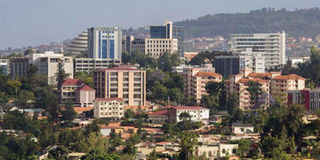Prime
Rwanda drops in ranking but remains top in region in ease of doing business

A view of Kigali. Rwanda’s reforms came in handy, making it even more investor-friendly. NMG PHOTO
What you need to know:
- The push for improving the business environment in sub-Saharan Africa has become contagious with countries like Nigeria and Togo getting motivation for reforms from neighbours.
- Although the report does not capture corruption and bribery directly, a vice that is rampant in Africa, it reckons that inefficient regulation tends to go hand in hand with rent-seeking.
East Africa continues to be an ideal destination for foreign investments after countries in the region posted improvements in facilitating ease of doing business.
Kenya, Uganda, Tanzania and Burundi saw their positions in the World Bank Ease of Doing Business 2020 ranking improve on the backdrop of reforms geared at making it easy for investors to start a business, get electricity connections, register property and deal with construction permits.
Rwanda, the best performing country on the continent in this ranking over the years, has dropped to position 38 from 29 after it scored 76.5 from 77.88, this being the first time the country has dropped in ranking in the past three years.
Kenya jumped to position 56 from 62 with Uganda rising to position 116 from 127, Tanzania is now position 141 from 144 while Burundi jumped to position 166 from 168.
Encouraging efficiency
South Sudan remained at position 185 out of 190 surveyed. Mauritius at 13 and Rwanda are the only two African countries ranked in the top 50.
Despite the drop, Rwanda remains on the path of making the country attractive to investors after it exempted new small- and medium-size enterprises paying trading licence tax in their first two years of operation and reduce water and sewage connection period.
Other reforms include a requirement for constructors to obtain liability insurance on buildings, improving the reliability of power supply by upgrading its power grid infrastructure and changing regulations for workers pertaining to weekly rest, working hours, severance payments, and reemployment priority rules after redundancy dismissals.
New Zealand and Singapore maintained the first and second position for the second year running while China displaced Denmark at number three in the ranking that measures business regulations in 190 countries with the aim of encouraging efficiency and supporting freedom to do business.
The report provides quantitative indicators on regulation for starting a business, dealing with construction permits, getting electricity, registering property, credit, protecting minority investors, paying taxes, trading across borders, enforcing contracts, and resolving insolvency.
Most improved
In Doing Business 2020, technology has emerged as a central component in facilitating business with countries that scored highest adopting widespread use of electronic systems.
All the 20 top-ranking countries have online business incorporation processes, have electronic tax filing platforms and allow online procedures related to property transfers.
Saudi Arabia, Jordan, Togo, Bahrain, Tajikistan, Pakistan, Kuwait, China, India and Nigeria emerged as the top improvers after implementing a total of 59 regulatory reforms accounting for one-fifth of all the reforms recorded worldwide.
The report shows that sub-Saharan Africa remains one of the weak-performing regions on the ease of doing business index with an average score of 51.8, well below high-income countries at an average of 78.4 and the global average of 63.
The region managed to raise its score by just 1 percentage point in Doing Business 2020, whereas countries in the Middle East and North Africa region raised their average score by 1.9.
The push for improving the business environment in sub-Saharan Africa has become contagious with countries like Nigeria and Togo getting motivation for reforms from neighbours.
Widespread reforms
Rwanda’s progress over the past 10 years for instance has inspired authorities in Kenya and Togo with several Togolese delegations visiting Kigali to learn about successful reforms.
The report shows that Kenya has maintained its stellar rise in the ranking due to widespread reforms that include reducing building permits fees and making them publicly available online, modernising electricity transmission and distribution and property registration was made faster by moving consents to transfer and payment verification online.
Kenya also recorded improvements in strengthening access to credit by introducing online registration, modification and cancellation of security interests and public online searches of collateral registry, protection of minority investors by requiring shareholders to approve the election and dismissal of an external auditor and made paying taxes easier by implementing an online filing and payment system for social security contributions.
The worst-scoring
Uganda has improved the monitoring and regulation of power outages by improving its calculations of the annual system average interruption duration index and system average interruption frequency index.
While Sub-Saharan Africa nations are making progress in making the business environment attractive, a total of 12 countries in the bottom 20 are from the region.
Although the report does not capture corruption and bribery directly, a vice that is rampant in Africa, it reckons that inefficient regulation tends to go hand in hand with rent-seeking.
“There are ample opportunities for corruption in economies where excessive red tape and extensive interactions between private sector actors and regulatory agencies are necessary to get things done,” it observed.
It added that the 20 worst-scoring countries on Transparency International’s corruption perceptions index average eight procedures to start a business and 15 to obtain a building permit.
“When low-income economies achieve higher levels of economic efficiency, they tend to reduce the income gap with more developed ones,” notes the report.




